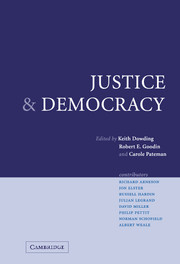Book contents
- Frontmatter
- Contents
- List of figures
- List of contributors
- 1 Introduction: between justice and democracy
- 2 Are democratic and just institutions the same?
- 3 Democracy is not intrinsically just
- 4 ‘The probability of a fit choice’: American political history and voting theory
- 5 Contractarian theory, deliberative democracy and general agreement
- 6 Democracy, justice and impartiality
- 7 Mimicking impartiality
- 8 Justice, democracy and public goods
- 9 The common good
- 10 Individual choice and social exclusion
- 11 Subnational groups and globalization
- References
- Brian Barry's publications
- Index
10 - Individual choice and social exclusion
Published online by Cambridge University Press: 22 September 2009
- Frontmatter
- Contents
- List of figures
- List of contributors
- 1 Introduction: between justice and democracy
- 2 Are democratic and just institutions the same?
- 3 Democracy is not intrinsically just
- 4 ‘The probability of a fit choice’: American political history and voting theory
- 5 Contractarian theory, deliberative democracy and general agreement
- 6 Democracy, justice and impartiality
- 7 Mimicking impartiality
- 8 Justice, democracy and public goods
- 9 The common good
- 10 Individual choice and social exclusion
- 11 Subnational groups and globalization
- References
- Brian Barry's publications
- Index
Summary
Why is social exclusion a problem? Why should we care about an individual ‘who does not participate in key activities of the society in which he or she lives’ – one definition of the socially excluded (Burchardt, Le Grand and Piachaud 2002: 30)? Does our concern arise from some kind of simple utilitarian or welfarist calculus: the excluded are miserable, and therefore we need to include them in society so as raise their welfare and thereby promote the greatest happiness for the greatest number? But what if the socially excluded are not in fact miserable? After all, not everyone necessarily wishes to participate in the ‘key activities of society’, whatever these may be. In particular, what if an individual or a group of individuals have voluntarily chosen to exclude themselves? What of the recluse who prefers solitude to human company, the religious sect that values its exclusivity, the young men on a run-down public housing estate who prefer to join a criminal gang rather than go to university? At the other end of the social scale, what of the rich who lock themselves away in gated communities? All of these individuals and groups may not be participating in the key activities of society; but do they all constitute a social problem? If so, is it the same kind of social problem as those who are socially excluded for reasons beyond their control, and what kind of problem is that?
- Type
- Chapter
- Information
- Justice and DemocracyEssays for Brian Barry, pp. 170 - 178Publisher: Cambridge University PressPrint publication year: 2004
- 5
- Cited by



